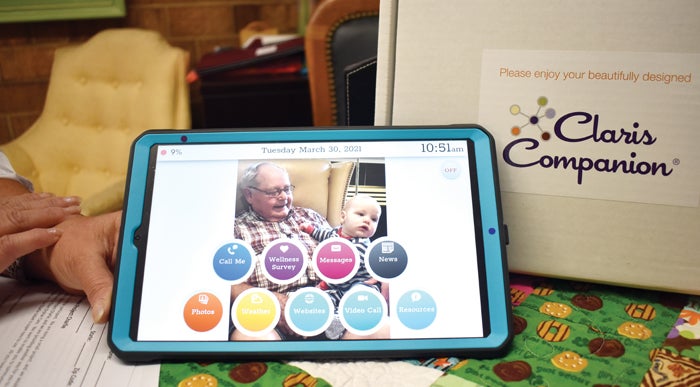Pilot program seeks to help seniors connect through technology
Published 12:00 am Thursday, April 1, 2021

- Although the tablet is technically called a Claris Companion, Meals on Wheels is calling it Charlie and is hoping the technology will help seniors reconnect with their friends and family. Ben Stansell/Salisbury Post
SPENCER — In an effort to curb social isolation, Meals on Wheels Rowan has partnered with Elder Orphan Care to pilot a program that gives homebound seniors a new way to connect with friends, family and the internet.
Called Project Charlie, the experimental initiative puts an easy to use tablet designed by Vancouver-based Claris Healthcare in the hands of older adults. Although the device’s technical name is a Claris Companion, Meals on Wheels rebranded the technology to make it more approachable and to represent its function.
“We want Charlie to be your friend,” said Cindy Fink, executive director of Meals on Wheels Rowan.
The need for the program arose at the start of the pandemic, when older adults were forced to isolate due to COVID-19.
“They were just so lonely and very isolated, some of them trying to quarantine hadn’t seen their families, hadn’t seen their neighbors,” Fink said. “We were getting that feedback starting in April and May and we said ‘What are we going to do about this?’”
After considering several different types of tablets, Meals on Wheels landed on the Claris Healthcare product due to its user-friendly interface and security features.
While some older adults may face difficulties when trying to use technology, Charlie boasts a simple configuration that allows users to easily navigate between apps by tapping a few on-screen buttons. There are even pre-written messages they can send with a simple tap.
“All it is is what I call bubbles,” Fink said. “If you want to type something in you could, but it’s not necessary.”
Every Charlie device is preloaded with a few stock apps, but each can be customized by a Meals on Wheels employee to match its user’s comfortability level.
Once the device arrives at a person’s doorstep, all they have to do is plug it in and it’s ready to go, Fink said. The hands-off rollout process has been especially helpful during a pandemic, Fink said, when they’re trying to minimize in-person contact with Meals on Wheels participants.
Like most tablets, the device can be used to send messages, make video calls or surf the web. However, there are additional features that make it exceptionally useful to older adults who live alone.
There are daily “wellness surveys” sent out to each Charlie user that ask how they are feeling. That feedback is monitored by Meals on Wheels employees and family members, who have access to a remote dashboard. The Charlie device can also be used to send someone a reminder to take medication. The device has the capability of becoming a way for users to connect with their doctors as well, Fink said, but that feature has not been fully explored yet.
“Charlie is not an emergency tool, but Charlie helps prevent a lot of emergencies,” Fink said. “If we find out several days in a row that someone is not feeling well when they get up, we’re going to investigate a little further, call their family members.”
Charlie users need not worry about their privacy being compromised or being scammed while using the device, Fink said. The only people who they can communicate with using Charlie are people who have been manually added to their contact list by a Meals on Wheels employee.
“It’s kind of like putting a white picket fence around their house,” Fink said. “The only people they can communicate with are the people inside their fence.”
There are currently about 10 participants in the pilot program. Thanks to a new grant from the Mariam and Robert Hayes Charitable Trust, Fink said they plan on buying 25 more devices to give out soon. A Charlie device costs a little less than $300, but there is a monthly fee to connect them to the internet; $25 for a wi-fi connection and $49 for cellular service.
The pilot program will run for a year before Meals on Wheels determines whether or not to make it permanent. That decision will be made based on how effective the devices are at improving the mental health of users.
“We did this initially to break the cycle of social isolation,” Fink said. “We’re looking for it to improve their mental health and also to improve how they feel about being connected in the community. That is a big thing.”
Before they receive their Charlie device, each senior is asked to fill out a questionnaire that evaluates their mental health and how much social interaction they typically have.
“This gives us an idea if they have been depressed,” Fink said. “Many of the folks who are socially isolated have been depressed.”
Each participant in the pilot program will be asked to fill out the same questionnaire after using Charlie for three months and then again after six months. The results of those subsequent surveys will be compared with the initial assessment. If the feedback is positive, more Meals on Wheels participants may get their own Charlie.
So far, Fink is encouraged by what she’s heard from Charlie users. One user, an 88-year old woman who didn’t use technology much before receiving her Charlie device, told Fink that she enjoys feeling like someone is checking in on her.
“I’m all about this,” Fink said. “I think this is the most awesome way to keep up with folks.”



